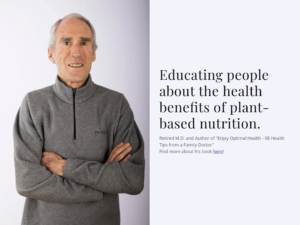 TRANSFORMATION OF HEALTHY WHOLE GRAINS TO UNHEALTHY REFINED GRAINS
TRANSFORMATION OF HEALTHY WHOLE GRAINS TO UNHEALTHY REFINED GRAINS
Health column by Dr. Greg Feinsinger. Champion of Whole Food Plant Based Living and righteous person.
Dr. David Kessler recently released a book called “Fast Carbs, Slow Carbs.” Fast carbs, also known as ultra-processed carbs, don’t require chewing, and quickly enter the upper part of the gastrointestinal track before they get to the part of the intestines where satiety (a feeling of fullness) is triggered–so people keep eating more and more. These “pre-digested foods” are immediately absorbed into blood stream, where they cause blood sugar and insulin spikes. When these spikes occur repeatedly over years, diabetes and obesity result.
Slow carbs on the other hand promote good health. These unprocessed vegetables, fruit, grains, nuts, and seeds contain fiber, require chewing, and are digested further down the GI tract where they trigger satiety. Digested slow carbs enter the blood stream slowly, without causing blood sugar and insulin spikes.
Fast carbs contribute to many chronic diseases that make us sick and kill us, including obesity, diabetes, heart disease, kidney disease, dementia, and cancer. Examples of fast carbs are breakfast cereals sold in boxes, chips and other snack foods, white bread, pizza crust, white flour tortillas, bagels, cookies, cakes, energy bars, doughnuts, and sugar (including soda and fruit juices). Even some of the new fake meats and cheeses—while certainly better for the environment– contain fast carbs.
Let’s follow a whole grain through the refining process. We’ll use wheat as an example, although rice, oats, barley, corn, and many other grains have similar characteristics. A kernel of wheat is also known as a wheat berry (even though it’s not a berry). It is covered by an inedible hull. The grain itself has 3 components: (1) bran, which contains B vitamins and fiber; (2) germ (embryo), which contains healthy fat, protein, B vitamins, and minerals; (3) and endosperm, which contains protein, starchy carbohydrate, iron, B vitamins, and fiber. The starch granules in whole grains contain tightly-packed glucose molecules which resist digestion until they reach the colon, where they nourish and are broken down by bacteria in the gut microbiome. Wheat berries in their natural state are healthy, and you can buy them locally at Natural Grocers.
As Dr. Kessler says, “a true whole grain…is one in which the endosperm, bran, and germ are never separated out. This preserves what scientists call the food matrix, or the original molecular structure of a food.” Coarsely ground milling preserves the food matrix. However, the majority of grain-based food you find in the grocery store has been milled into white flour, by separating the bran and germ from the starchy endosperm. Most “whole wheat” products have been processed like this as well, and Dr. Joel Fuhrman likes to joke that “whole wheat bread is just white bread with a tan.”
Further processing includes high-speed steel rollers, that disrupt the bonds of the starch granules. The next step is often extrusion cooking at up to 300 degrees, which destroys the natural structure of the food by converting long-chain resistant starch to shorter starches called dextrose, which enables faster absorption in the small intestine. A final step for many processed foods is “gun puffing,” resulting in products such as Rice Krispies, Cheerio’s, and Cheetos.
Salt, sugar, and fat—usually in the form of oil—are added to make these ultra-processed foods more addictive As food company scientists are well aware, these 3 ingredients trigger dopamine—the same neurotransmitter that narcotics, tobacco, and alcohol trigger– in the pleasure center of the brain, resulting in addiction to “get people to keep eating—and purchasing—their products.” Food companies shamelessly get young children addicted to salt, sugar, fat, and ultra-processed carbohydrates.
A large percentage of the S.A.D. (standard American diet) consists of fast carbs. As Dr. Fuhrman likes to say, the S.A.D. was designed by ISIS. And unfortunately for the rest of the planet, we’re exporting our diet and ultra-processed fast foods throughout the world.
,
Leave a Reply